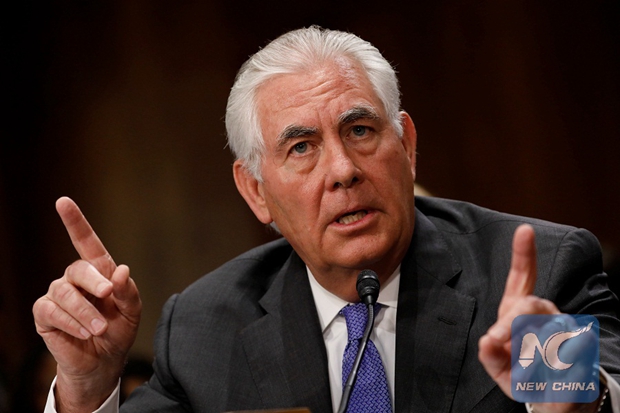Arming of Ukraine and Tillerson's meaningless speech
- By Sumantra Maitra
 0 Comment(s)
0 Comment(s) Print
Print E-mail China.org.cn, December 06, 2017
E-mail China.org.cn, December 06, 2017

U.S. Secretary of State Rex Tillerson [Photo/Xinhua]
U.S. Secretary of State Rex Tillerson's recent big policy speech at the Wilson center provides hints on the future of Trump's foreign policy. Heavy on anecdotes and history and low on actual policy proposals, the speech touched upon standard Republican principles, including the fact that the U.S. would try and promote democracy, human rights, and should be a force for good in the world.
At the Wilson center, arguably the pillar of liberal democratic foreign policy consensus in the U.S., Tillerson repeatedly mentioned Theodore Roosevelt, the man who, in 1901 in a speech about the Monroe Doctrine, repeatedly mentioned the virtues of hard power, and of keeping quiet without drawing any visible red lines, or setting targets in international politics.
The motto was keep quiet, and carry a big stick, something which has inspired various leaders across the world, regardless of political ideology. The Monroe Doctrine, as readers of foreign policy might know, is the idea that the United States would be the sole power which dominates the Asia Pacific, and opposes the rise of any hegemon.
There's however two problems in that speech, which was focused on reassuring allies. First, the interests of the U.S. and primary U.S. allies in Europe are now completely different. Take the case of the EU. If we take the EU as an institution, then primarily the EU and U.S. are opposed with regards to liberal rights as well as trade.
The EU and the U.S. are showing trade war tendencies, which will happen sooner or later, as the EU keeps fining and punishing U.S. companies. Sooner or later there will be a backlash. Overall EU interests are different from the U.S., which is already showing signs of a rift with regard to the environment and democratic rights or trade with China.
If you consider the EU nations as component parts then it gets even more complicated. Eastern states, like the Baltics and Poland are closer to the U.S., especially the Trump administration, in matters related to Russian aggression. On the other hand, Western European countries are not as worried about Russia, but rather more worried about terrorism, something which Trump administration cannot solve at all.
The big issue here is Russia. Russia is a giant in Europe, with the largest armed forces, and two European wars in the last decade under its belt. And the Trump administration is not sure how to deal with it. Should there be a détente with Russia over east Europe? Then countries like Georgia and Ukraine's fate will be sealed.
By that logic, the Trump administration needs to come clear on where they stand, with regards to promoting human rights and liberalism, because they can't promote liberalism and human rights in east Europe without a backlash. Should the Trump administration provide weapons to Ukraine? That would be a disaster as then there would be a Syria right in the middle of Europe. Russia will not back down, and the result will be an escalation of their dominance in Europe, as Russia has more reasons to feel threatened with Ukraine as an EU or U.S. client.
The result will inevitably be a counter escalation by Russia, resulting in more deaths and a spreading of the war, and maybe an outright invasion on the pretext of protecting the Russian speaking minority in Eastern Ukraine.
Finally, the EU is under opposing forces, with the liberal west and conservative east pushing the institution in different directions. There is no way that it is sustainable, and the liberal order that was dependent on it, is bound to collapse under the weight of its own contradiction sooner or later. The Trump administration or the United States is powerless to prevent this in the long run of history.
This brings us to the crux of the matter. Lament the retreat of the U.S. is pointless, as it does not matter if the U.S. is willing to defend the liberal order, but rather if the U.S. is capable of defending it.
During the Suez crisis, the British Empire tried to reassert dominance in the Middle East. It failed, after the Suez crisis, not because it wasn't willing to, but rather it lacked the capability. With the U.S. focusing on Asia, its military stretched, mired down in nation building in the Middle East, and its population isolationist, it is unlikely the U.S. will be able to commit any more resources or manpower to ideological causes. The speech, therefore, for all practical purposes, remains a meaningless and hollow endeavor.
Sumantra Maitra is a columnist with China.org.cn. For more information please visit:
http://www.china.org.cn/opinion/SumantraMaitra.htm
Opinion articles reflect the views of their authors only, not necessarily those of China.org.cn.






Go to Forum >>0 Comment(s)